Podcast: Play in new window | Download
Subscribe: RSS
Right after the University of Alabama had just won its third (or fourth?) national championship under head coach Nick Saban, the look on his face was telling.
As the players and fans celebrated on the field and in the stands, the greatest college football coach of our generation seemed “slightly” pleased and occasionally cracked a smile as one of his players came over to give him a big hug.
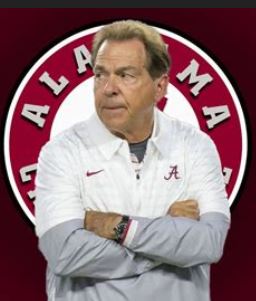
When my wife and I discussed why Coach Saban didn’t appear too happy, I said, “It’s probably because he’s already thinking about how to win it again next season.”
Sure enough, Saban was interviewed a few days later and (effectively) said, “We’re going to lose a lot of those players to the NFL. We can celebrate for a few days, but then it’s time to get back to work.”
It made me sad to know that the best coach in college football felt like he couldn’t let his guard down for a while and allow himself to wind down for a few weeks.
For Nick Saban, the drive for perfection and championships served as his personal motivation.
Now retired, he worked for nearly 50 years (34 as a head coach) in a highly competitive business. Other coaches watched his every move and schemed to knock him off the top of that ladder.

During last Saturday’s LSU vs. Florida football game, the 4-5 Gators (sparked by a sell-out home crowd) played with great passion against the Tigers. Florida’s players and fans all knew that their team’s football coach (Billy Napier) would likely be fired if the Gators dropped this game to the Tigers.
A team sport like football is (generally) played with great passion. When two football teams have players of similar size and skills, the difference often comes down to coaching. The team which is best prepared for a game often wins by managing their passion by relying on disciplines learned long before kick-off.
Coach Nick Saban urged his players to “Trust the Process”.
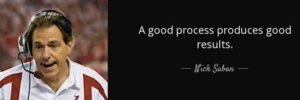
The smallest details really do matter.
That is especially true when it comes to winning football games against opponents with similar abilities. If your team commits fewer penalties, has less turnovers, and executes its plays and game plan better than the other side, you have a higher chance of coming out on top.
Discipline starts in practice. Mastering the fundamentals (getting into the proper stance, lining-up properly, and knowing your team’s playbook) must occur before a team starts running even the most basic plays in practice.
Once the team masters the first level, the coaches will add more elaborate plays and schemes geared to defeat upcoming opponents.
The head coach of a football team functions much like a band or orchestra leader.
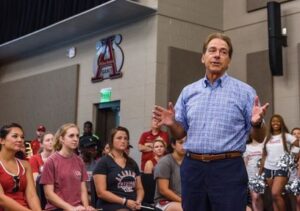
Since he doesn’t play an instrument, the head coach’s job is to insure that the music (game plan) is executed well. All of those talented individual players must willingly accept instruction and follow the directions of their leader.
Last Saturday evening in Gainesville, Florida, LSU head football coach Brian Kelly looked as defeated as his team was.
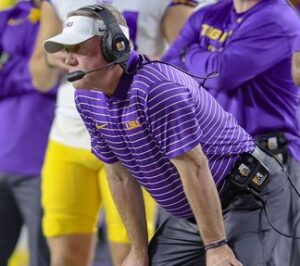
He spent most of the second half with his hands on his thighs in frustration as LSU fell to 6-4 with a 27-16 loss at 5-5 Florida.
LSU has now lost three straight games after starting the season 6-1. Saturday’s loss at Florida ended Coach Brian Kelly’s 7-year personal streak of leading his teams to ten or more wins (the last five seasons at Notre Dame and his first two years at LSU).
As one of the most successful college football coaches of the past twenty years, Brian Kelly is paid handsomely to coach at LSU. Now in the third year of a 9-year $95 million contract, the 63-year old Kelly is one of America’s highest paid college football coaches.

Whether measured by wins and losses (or at the bank), Coach Brian Kelly should still be a happy man.
He just doesn’t look that way – at least recently.
A spot in the College Football Playoffs is now off the table. LSU’s rabid fan base is not happy about the prospects of their team playing in a late December bowl game – even in sunny central Florida.
NIL offers will be coming for some of LSU’s most talented players. Several will vamoose to take more money and/or receive more playing time at another school – possibly leaving town before December arrives.
The usually unflappable LSU coach has begun to face a more unpleasant line of questioning from the press during this three-game losing streak.
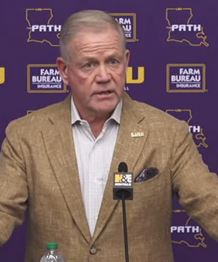
The social media backstabbers are, of course, out to get him.
It would take more than $60 million for LSU’s big money backers to dismiss the coach with six years left on his contract. Brian Kelly knows that the whispers have become more audible in recent weeks.
Even if LSU finishes with an 8-4 regular season by defeating both 6-4 Vanderbilt and 5-5 Oklahoma at home in the final two weeks, Tiger fans are not happy with the 2024 season.

Regardless of how much money Coach Brian Kelly is paid, he left Notre Dame to take the job at LSU with the goal of winning championships in Baton Rouge.
His biggest critic is likely to be himself.
Losing is tough. The pressure associated with losing builds by the week.
Even the nation’s best college coaches often find themselves out of a job
One of the greatest college football coaches of all time was Alabama’s Paul “Bear” Bryant. Every year, the “Paul ‘Bear’ Bryant Award” is given to the top college football coach for that season.

Let’s review a list of the coaches who received this honor over the past 15 years and see where they are today!
2023 – Mike Norvell, Florida State (1-10 in 2024 and fans want to fire him ASAP)
2022 – Sonny Dykes, TCU (6-4 this season – his job seems safe – for now)
2021 – Luke Fickell, Cincinnati (took Wisconsin job in 2023 – just 5-5 in 2024)
2020 – Nick Saban, Alabama (retired after 2023 season – now with ESPN)
2019 – Ed Orgeron, LSU (fired in 2021, still unemployed)
2018 – Dabo Swinney, Clemson (8-2 in 2024 and seems secure in his job this season)
2017 – Scott Frost, Central Florida (took Nebraska job in 2018-fired after 2022 season)
2016 – Dabo Swinney, Clemson (still there)
2015 – Dabo Swinney, Clemson (still there)
2014 – Gary Patterson, TCU (resigned/fired after 2021 season)
2013 – Gus Malzahn, Auburn (fired after 2020 season, now head coach at UCF)
2012 – Bill O’Brien, Penn State (took Houston Texans job 2013 – fired in 2020, now at Boston College)
2011 – Mike Gundy, Oklahoma State (3-8 this year – In 20th season with record of 169-86)
2010 – Gene Chizik, Auburn (fired in 2012 – now Defensive Coordinator at UNC)
2009 – Chris Peterson, Boise State (took Univ. of Washington job 2013 – resigned 2019)
That makes five of the 13 coaches (Orgeron, Frost, Patterson, Malzahn and Chizik) who have been fired from the schools where they had won national “Coach of the Year” honors.

Two (Nick Saban and Chris Peterson) have retired from football. We still see Coach Saban every Saturday morning on ESPN’s College Game Day show.
Coaching at the highest level isn’t for everyone
Why did a relatively young and successful coach like Chris Peterson (with a record of 147 wins and just 38 losses at Boise State and the University of Washington) get out of coaching five years ago at age 55?
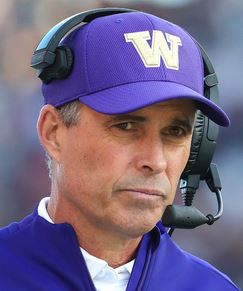
Here’s what former coach Chris Peterson told a reporter three years after he left the University of Washington:
“I had the most beautiful job and I worked my whole life to (get) to the University of Washington,” said Peterson. “It is a wonderful university and I was aligned with the administration. And I’m not enjoying this and I’m frustrated with this?
“What’s wrong with me?” he continued. “I could not make sense of it. So since stepping away, I’ve made a lot of sense of it and have talked to a thousand coaches and business leaders.
“What is the purpose of you coaching? It’s not just to win a bunch of games. Making a bunch of money? That can’t be your purpose. That might be part of one of your goals. That stuff is short-lived. So what is the purpose of your life and why are you working in this arena?”
Former college football coach Chris Peterson believes that the new NCAA Transfer Portal can work two different ways. Players are able to quickly change schools, but coaches can encourage some of the locker room divas to take their bad attitudes somewhere elsewhere.
“With the (transfer) portal, I give the same advice as with my career – I think you need to be slow to go somewhere”, Peterson added. “The thing I think about the portal is that, as coach, is that no coach — if you cannot help this team and don’t bring value to the locker room and help the team, no coach wants you to stay there. They want you to go — if you are not this level of a player — to go somewhere else where you can play.”
“Blame the Coach” has become an epidemic
There are 14 universities which comprise the American Athletic Conference (AAC).
In the past few weeks, an incredible five coaches in the AAC have been dismissed.

Rice – Mike Bloomgren – 6 ½ years with a record at Rice of 24-52
East Carolina – Mike Houston – 5 ½ years (27-38)
Temple – Stan Drayton – 2 ½ years (9-25)
Charlotte – Biff Poggi – 1 ½ years (6-16)
Florida Atlantic – Tom Herman – 1 ½ years (6-16)
Around the country, head coaching vacancies now exist at Kennesaw State (Conference USA), Ball State and Central Michigan (MAC), Fresno State and Utah State (Mountain West), Southern Miss (Sunbelt), and UMass (an independent).
That’s 12 of the 134 schools in the upper division of college football that are searching for a new coach. The number could double by this time in December.

Any college football coach who reaches the top rung in the profession knows that it can come crashing down quickly. The chances of being fired are astronomically higher than having the school’s supporters build a statue of you outside of the football stadium (such as Nick Saban has at Alabama).
As the head coach wins, the pressure ramps up. You must keep on winning and achieve even more as your salary also rises.
If you lose, you’ll be gone at some point. Save your money and invest wisely.

No wonder most of the head football coaches in college football look so unhappy.

